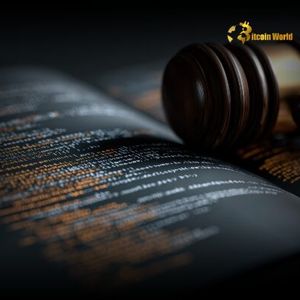UK High Court Issues Stern Warning on AI in Law, Fake Citations
3 min read
BitcoinWorld UK High Court Issues Stern Warning on AI in Law, Fake Citations In the rapidly evolving landscape of technology, where artificial intelligence tools are becoming increasingly prevalent, even professions steeped in tradition like law are grappling with their integration. For those in the cryptocurrency and blockchain space, who are often early adopters of new tech, this development highlights the critical need for scrutiny, especially concerning AI in law. Why is the UK High Court Warning About AI in Law? The High Court of England and Wales recently issued a significant warning to lawyers regarding the use of artificial intelligence in their professional work. This follows concerns raised in multiple cases where AI tools were seemingly used without adequate verification, leading to serious errors. Judge Victoria Sharp, in a ruling consolidating insights from two specific cases, stated clearly that generative AI tools like ChatGPT are “not capable of conducting reliable legal research.” She elaborated: AI can produce responses that seem coherent and plausible. However, these responses may be entirely incorrect. AI can make confident assertions that are simply untrue. This unreliability poses a direct threat to the integrity of legal proceedings. The Problem of Fake Citations A primary concern highlighted by the court is the generation of fake citations. In the cases reviewed, lawyers submitted court documents containing references to non-existent legal cases or misrepresenting the content of real cases. One striking example involved a filing with 45 citations, where 18 cases did not exist. Many others did not contain the quoted text, did not support the arguments made, or were irrelevant. Another case saw a lawyer citing five cases that also did not appear to exist. While one lawyer denied using AI directly, suggesting citations might have come from AI summaries found online, the court’s message is clear: the source of unreliable information is less important than the failure to verify it. What are Lawyer Ethics and Professional Duties in the Age of Legal Tech? The court emphasized that lawyers have a professional duty to the court. This duty includes ensuring the accuracy of any information presented, especially when relying on research tools. Judge Sharp stressed that using AI in legal research does not absolve lawyers of this responsibility. Lawyers must take stronger steps to prevent the misuse of artificial intelligence. This means checking the accuracy of AI-generated research against authoritative sources before using it in their work. The increasing number of cases involving apparent AI-generated falsehoods, even from lawyers representing major AI platforms, indicates that current guidance needs better adherence. The ruling is being forwarded to professional bodies like the Bar Council and the Law Society to reinforce this message and ensure lawyers comply with their duties. What Penalties Could Lawyers Face for Using Fake AI Citations? The UK High Court warned that lawyers who fail to comply with their professional obligations regarding AI research risk severe sanctions. While contempt proceedings were not initiated in the specific cases discussed, the court made it clear this was not a precedent for future instances. The court’s powers to address breaches of duty range significantly. These can include: Public admonition Imposition of costs against the lawyer Contempt proceedings (which can result in fines or imprisonment) Referral to professional regulators Even referral to the police in serious matters Both lawyers involved in the cited cases were referred to professional regulators, underscoring the seriousness with which these failures are being treated. Conclusion: Navigating Legal Tech Responsibly The UK High Court’s stern warning serves as a critical reminder for all professionals using new technologies, particularly AI in law. While legal tech tools offer potential efficiencies, their outputs must be treated with caution and subjected to rigorous verification against trusted sources. The integrity of the legal process depends on the accuracy of the information presented, and lawyers must uphold their ethical duties to the court, or face potentially severe consequences for presenting fake citations or other AI-generated inaccuracies. To learn more about the latest AI in law trends, explore our article on key developments shaping AI features and institutional adoption. This post UK High Court Issues Stern Warning on AI in Law, Fake Citations first appeared on BitcoinWorld and is written by Editorial Team

Source: Bitcoin World



